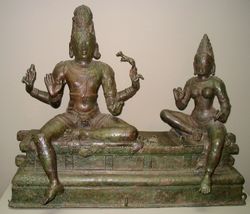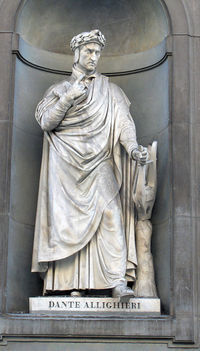| Millennium: |
2nd millennium |
| Centuries: |
13th century · 14th century · 15th century |
| Decades: |
1300s 1310s 1320s 1330s 1340s
1350s 1360s 1370s 1380s 1390s |
| Categories: |
Births – Deaths
Establishments – Disestablishments |

This 14th-century statue from south
India depicts the gods
Shiva (on the left) and Uma (on the right). It is housed in the Smithsonian Institution in
Washington, D.C..
As a means of recording the passage of time, the 14th century was that century which lasted from 1301 to 1400.
Events
- The transition from the Medieval Warm Period to the Little Ice Age
- Beginning of the Ottoman Empire, early expansion into the early Balkans
- The Avignon papacy transfers the seat of the Popes from Italy to France
- The Great Famine of 1315-1317 kills millions of people in Europe
- Being forced out of previous locations, the Mexica found the city of Tenochtitlan in 1325
- Battle of Kosovo in 1389 between Serbs and Ottoman Turks, Prince Lazar, sultan Murat I and Miloš Obilić were killed
- The Vijayanagara Empire is founded in South India by Harihara in 1336
- The Hundred Years' War begins when Edward III of England lays claim to the French throne in 1337.
- Black Death kills almost half of the population of Europe. ( 1347 - 1351)
- The Battle of Lake Poyang, a naval conflict between Chinese rebel groups led by Chen Youliang and Zhu Yuanzhang, took place in August to October of 1363, and was one of the largest naval battles in history.
- The end of Mongol Yuan Dynasty in China and the beginning of the Ming Dynasty ( 1368)
- The heresy of Lollardy rises in England
- The Great Schism of the West begins in 1378, eventually leading to 3 simultaneous popes.
- An account of Buddha's life, translated earlier into Greek by St John of Damascus and widely circulated to Christians as the story of Barlaam and Josaphat, became so popular Buddha (under the name Josaphat) was made a Catholic saint.
- Singapore emerges for the first time as a fortified city and trading centre of some importance.
- Reunification of Poland under Ladislaus I of Poland
- Peasants' Revolt in England
- Islam reaches Terengganu, on the Malay Peninsula.
- The Hausa found several city-states in the south of modern Niger.
- The Mali Empire expands westward and conquers Tekrur.
- The poet Petrarch coins the term Dark Ages to describe the preceding 900 years in Europe, beginning with the fall of the Western Roman Empire in 476 through to the renewal embodied in the Renaissance.
- The Scots win the Scottish Wars of Independence.
- Union of Krewo between Poland and Lithuania.
- Work begins on the Great Enclosure at Great Zimbabwe, built of uncemented, dressed stone. The city's population is now between 10,000 and 40,000.
- Beginning of the Renaissance in Italy
- The English word "abacus" used to describe the calculating device from China.
- Wang Dayuan, the first Chinese to sail into the Mediterranean while visiting Egypt and North Africa from 1334- 1339.
Significant people

Statue of Dante Alighieri at the Uffizi, Florence
- Dante Alighieri, Italian poet and writer ( 1265 - 1321).
- King Robert the Bruce of Scotland, victor of the First War of Scottish Independence against the invading Kingdom of England ( 1274 - 1329).
- Juan Manuel, Duke of Penafiel, Spanish author ( 1282 - 1349).
- William of Ockham, English Franciscan friar and philosopher (c. 1285 - 1347).
- Charles I of Hungary, military, diplomatic and financial reformer, restoring the Kingdom of Hungary to power ( 1288 - 1342).
- Chen Youliang, Chinese rebel leader and arch nemesis to Zhu Yuanzhang (aka Emperor Hongwu)
- Isabella of France, queen consort and regent of the Kingdom of England (c. 1295 - 1358).
- Guillaume de Machaut, French composer and poet (c. 1300 - 1377).
- Ibn Battuta, Arab Muslim traveler ( 1304 - 1368/ 1377).
- Jiao Yu, Chinese general and author of the Huolongjing military treatise
- Liu Ji, an Chinese general, court advisor, philosopher, and co-editor of the Huolongjing
- Francesco Petrarch, Italian poet and writer ( 1304 - 1374).
- Casimir III of Poland, expansionist and financial reformer ( 1310 - 1370).
- Hafez Persian poet (c. 1310 - 1379.
- Edward III, King of England. His claim to the throne of France resulted in the Hundred Years' War ( 1312 - 1377).
- Giovanni Boccaccio, Italian author ( 1313 - 1375).
- Timur, Central Asian warlord and founder of the Timurid Dynasty ( 1336 - 1405).
- Geoffrey Chaucer, English poet (c. 1343 - 1400).
- Mansa Musa (d. 1347), King of the Mali Empire while it was the source of almost half the world's gold.
- Christine de Pizan, French writer ( 1364 - 1430).
- Hongwu Emperor, founder of the Ming Dynasty in China ( 1328 - 1398)
Inventions, discoveries, introductions
- music of the Ars nova
- The technique of knitting
- Foundation of the University of Cracow
- Chinese text the Huolongjing by Jiao Yu describes fire lances, fire arrows ( rockets), rocket launchers, land mines, naval mines, bombards, cannons, and hollow cast iron cannonballs filled with gunpowder, and their use to set ablaze enemy camps.
Decades and years
|
Decades and years |
|
|
14th century12th century←13th century← ↔ →15th century→16th century
| 1290s |
1290 |
1291 |
1292 |
1293 |
1294 |
1295 |
1296 |
1297 |
1298 |
1299 |
| 1300s |
1300 |
1301 |
1302 |
1303 |
1304 |
1305 |
1306 |
1307 |
1308 |
1309 |
| 1310s |
1310 |
1311 |
1312 |
1313 |
1314 |
1315 |
1316 |
1317 |
1318 |
1319 |
| 1320s |
1320 |
1321 |
1322 |
1323 |
1324 |
1325 |
1326 |
1327 |
1328 |
1329 |
| 1330s |
1330 |
1331 |
1332 |
1333 |
1334 |
1335 |
1336 |
1337 |
1338 |
1339 |
| 1340s |
1340 |
1341 |
1342 |
1343 |
1344 |
1345 |
1346 |
1347 |
1348 |
1349 |
| 1350s |
1350 |
1351 |
1352 |
1353 |
1354 |
1355 |
1356 |
1357 |
1358 |
1359 |
| 1360s |
1360 |
1361 |
1362 |
1363 |
1364 |
1365 |
1366 |
1367 |
1368 |
1369 |
| 1370s |
1370 |
1371 |
1372 |
1373 |
1374 |
1375 |
1376 |
1377 |
1378 |
1379 |
| 1380s |
1380 |
1381 |
1382 |
1383 |
1384 |
1385 |
1386 |
1387 |
1388 |
1389 |
| 1390s |
1390 |
1391 |
1392 |
1393 |
1394 |
1395 |
1396 |
1397 |
1398 |
1399 |
| 1400s |
1400 |
1401 |
1402 |
1403 |
1404 |
1405 |
1406 |
1407 |
1408 |
1409 |
|
|
|
Centuries and millennia |
|
|
| Millennium |
Century |
| BC |
| 4th |
40th |
39th |
38th |
37th |
36th |
35th |
34th |
33rd |
32nd |
31st |
| 3rd |
30th |
29th |
28th |
27th |
26th |
25th |
24th |
23rd |
22nd |
21st |
| 2nd |
20th |
19th |
18th |
17th |
16th |
15th |
14th |
13th |
12th |
11th |
| 1st |
10th |
9th |
8th |
7th |
6th |
5th |
4th |
3rd |
2nd |
1st |
| AD |
| 1st |
1st |
2nd |
3rd |
4th |
5th |
6th |
7th |
8th |
9th |
10th |
| 2nd |
11th |
12th |
13th |
14th |
15th |
16th |
17th |
18th |
19th |
20th |
| 3rd |
21st |
22nd |
23rd |
24th |
25th |
26th |
27th |
28th |
29th |
30th |
| 4th |
31st |
|
|

